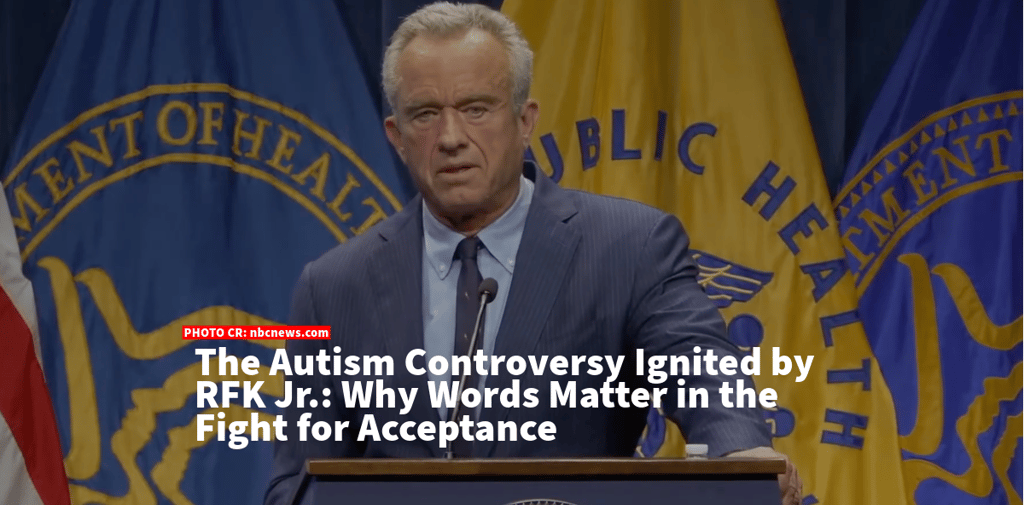The Autism Controversy Ignited by RFK Jr.: Why Words Matter in the Fight for Acceptance
4/17/2025


The Autism Controversy Ignited by RFK Jr.: Why Words Matter in the Fight for Acceptance
On April 16, 2025, a single X post lit a firestorm online, exposing deep divides in how we talk about autism. Robert F. Kennedy Jr., the newly appointed U.S. The Health and Human Services Secretary stood at a podium during a C-SPAN broadcasted press conference, flanked by American flags, and delivered a statement that left many reeling. “These are kids who will never pay taxes, they'll never hold a job, they'll never play baseball, they'll never write a poem. They'll never go out on a date. Many of them will never use a toilet unassisted,” he said, speaking about autistic children. The clip, shared by
@Acyn, on X, racked up thousands of reactions within hours, and for good reason—it struck a nerve.
A Rising Rate and a Loaded Narrative
The backdrop to RFK Jr.’s statement is the latest CDC data: autism prevalence among U.S. children has climbed to 1 in 31 in 2022, up from 1 in 36 in 2020. RFK Jr. called this an “alarming” epidemic, pushing a narrative that environmental toxins—like vaccines—are to blame. But here’s the catch: experts, including those from the CDC and Autism Society of America, attribute this rise to better screening, broader diagnostic criteria, and increased awareness, not a sudden surge in cases. A 2023 study in Pediatrics (DOI: 10.1542/peds.2022-058943) reinforces this, showing that improved early detection accounts for much of the increase. RFK Jr.’s claim, however, echoes a long-debunked theory linking vaccines to autism, a myth that persists despite a 2014 meta-analysis in Vaccine (DOI: 10.1016/j.vaccine.2014.04.085) finding no such connection.
The X Backlash: Voices of Resistance
The X community didn’t hold back.
@NikosUnity, fired off, “Autistic people pay taxes. Autistic people work. Autistic people fall in love. RFK Jr. just doesn’t see them as human.”
@SouthernBama, called him a “worm-brained idiot,” pointing out that millions of autistic individuals lead normal, productive lives. @EvaristusOdinikaeze labeled the rhetoric “cruel” and “ableist,” arguing it reduces autistic children to economic burdens rather than recognizing their inherent worth. The sentiment was clear: RFK Jr.’s words weren’t just misguided—they were harmful.
Autism isn’t a monolith. It’s a spectrum, and while some individuals may need lifelong support, many thrive in ways RFK Jr. dismissed outright. Take
@NavyStrang’s response: “My son is autistic. He paid taxes last year. He has a job. He’s going to college. He’s an Eagle Scout.” Stories like these aren’t outliers—they’re proof of the diversity within the autistic community, a diversity RFK Jr.’s blanket statement erases.
Why This Matters: The Weight of Ableism
Ableism—the systemic discrimination against disabled people—has real consequences. A 2017 meta-analysis cited in Wikipedia’s entry on autism discrimination found that neurotypical people form negative first impressions of autistic individuals within seconds, impacting their social and professional opportunities. Autistic adults face unemployment rates as high as 85% in some regions, per the UK Office for National Statistics, often due to a lack of workplace inclusivity and societal stigma. RFK Jr.’s words, delivered from a position of power, risk amplifying this stigma, framing autistic individuals as burdens rather than contributors.
The Autism Society of America pushed back in a statement: “This rise in prevalence does not signal an ‘epidemic’… it reflects diagnostic progress.” Experts like Dr. Catherine Lord from UCLA emphasize that autism’s causes are complex, involving genetic and environmental factors, not a single “toxin” as RFK Jr. claims. His promise to identify this cause by September 2025 has been met with skepticism. Dr. Peter Marks, a former FDA vaccine official, told CBS, “Giving [families] false hope is wrong.”
A Call for Better Dialogue
RFK Jr.’s statement isn’t just a policy misstep—it’s a cultural one. Words shape perceptions, and when a public figure with a platform as large as his paints autism as a tragedy, it undermines the neurodiversity movement’s push for acceptance over “cures.” Autistic advocates argue that neurodivergence should be valued, not pathologized. A 2023 article from PMC (DOI: 10.1007/s10803-023-05921-4) notes that ableist assumptions in research have historically led to stigmatizing interventions that prioritize “normalizing” autistic people over supporting their actual needs.
The X reactions show a hunger for a better conversation—one that centers autistic voices and acknowledges their humanity. As
@WNBAPILLED, quibbled, “RFK Jr. saying autistic people will never play baseball—have you ever heard a major league pitcher talk?” Humor aside, the point stands: autistic individuals defy stereotypes every day. They deserve a narrative that reflects that reality.
What’s Next?
This controversy isn’t going away. RFK Jr.’s HHS has pledged new studies to pinpoint environmental causes of autism, but without a grounding in science, as critics like Dr. Zachary Warren from Vanderbilt University warn, these efforts may do more harm than good. Meanwhile, the autistic community continues to fight for dignity and inclusion, pushing back against rhetoric that diminishes their worth.
So, where do we go from here? How do we balance the need for research with the imperative to avoid stigmatization? And what role should public figures play in shaping this discourse? I’d love to hear your thoughts, because if there’s one thing this debate shows, it’s that the conversation around autism is far from over.
Thought-Provoking Questions:
How can we ensure autism research prioritizes the needs and voices of autistic individuals over societal biases?
What responsibility do public figures like RFK Jr. have in shaping perceptions of neurodiversity, and how should they be held accountable?
In what ways can we, as a society, move toward a more inclusive narrative about autism that celebrates differences rather than fears them?
hello@boncopia.com
+13286036419
© 2025. All rights reserved.